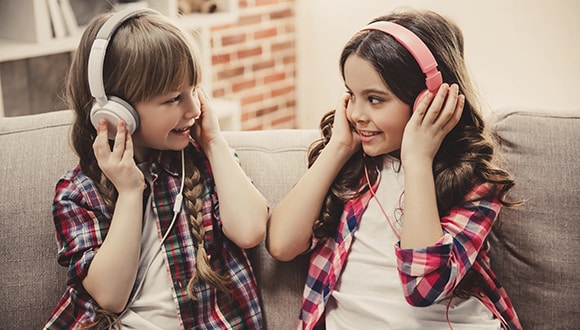How easy is it to damage your hearing?
With 1 in 7 Australians suffering from some form of hearing loss, it’s important to protect your hearing from an early age. Here’s how.
Lucy E Cousins
June 2018
Hearing is something many of us take for granted as we talk to friends, attend meetings and listen to music. But unfortunately, hearing loss is a common condition experienced by around 3.6 million Australians.
This progressive hearing loss is different to a congenital hearing defect, which is present at birth. Newborn babies have their hearing tested before they leave hospital using a newborn screening test by a specially trained nurse, midwife or hearing screener.
Hearing loss can be caused by age, noise exposure, disease and injury. A report from the Hearing Care Industry Association (HCIA) found that nearly a third of cases are estimated to be preventable.

How does our hearing work?
Our hearing is created using a combination of 3 sections of our ears, which work in harmony to convert sound vibrations into messages for our brains. First the vibration, or sound wave, is captured by our outer ear. It’s then converted into pressure waves by our middle ear, before being translated by the inner ear into signals that can be understood by our brain.
If this chain of events is broken at any point, it could result in hearing difficulties. These include having trouble understanding people who aren’t facing you, needing to increase the TV volume to a level that is uncomfortable for others, finding it difficult to follow a conversation, having difficulty hearing in loud places and experiencing a constant buzzing, known as tinnitus.
Why do we experience hearing loss?
There are 2 main types of hearing loss – conductive and sensorineural, and you can also have a mixture of both.
Conductive hearing loss includes the presence of foreign objects, wax or liquid in the outer or middle ear caused by colds, infections or allergies. It can also be caused by problems with the ear canal or ossicles (3 little bones in your inner ear). In most cases, conductive hearing loss can be fixed in surgery or with medication.
Sensorineural hearing loss can be caused by noise pollution, head trauma, ageing or certain drugs or viruses. This damage is likely to be permanent.
Protect your hearing
The best way to protect your ears is to avoid loud noises.
Protect your hearing when using headphones by keeping the volume low. Noise-cancelling versions can help block out surrounding sounds and some devices let you set your own maximum volume. Take regular breaks from listening with headphones.
Exposure to loud sounds can cause hearing loss so it's a good idea to wear ear plugs when you’re exposed during activities like riding motorbikes, using power tools, at firework displays or music events.
Testing your hearing
There are several ways to test your hearing; the easiest is online. The government-funded Know Your Noise offers a digital noise test that can be done at home, while Connect Hearing has an online Speech Perception Test, which measures your ‘speech sounds’ ability.
For an expert assessment or hearing test, Australian Hearing offer free tests for adults and Audiology Australia features a list of registered audiologists and their contact details.
If you suspect you have hearing loss, get tested. This can help you establish the extent of your impairment, prevent further hearing loss and get treatment, if needed.
For more information on coping with hearing impairment, watch these inspiring, real stories on how children cope with their condition and how it affects their daily lives.
Related articles
COPING WITH HEARING IMPAIRMENT
Children with a hearing impairment talk about how they deal with it at school and in their everyday lives.
IS YOUR BODY OLDER THAN YOUR ACTUAL AGE?
Ways to get your ‘biological age’ to match your ‘chronological age’.
HEALTH CHECKS BY AGE: THE TESTS YOU SHOULD BE HAVING
Your guide to staying on top of your health, through every stage of life.
YOUR SKIN CHECK CHECKLIST
If caught early, skin cancer can be successfully treated so checking your skin regularly is vital.
IMPORTANT INFORMATION
This communication contains information which is copyright to The Hospitals Contribution Fund of Australia Limited (HCF). It should not be copied, disclosed or distributed without the authority of HCF. Except as required by law, HCF does not represent, warrant and/or guarantee that this communication is free from errors, virus, interception or interference. All reasonable efforts have been taken to ensure the accuracy of material contained on this website. It’s not intended that this website be comprehensive or render advice. HCF members should rely on authoritative advice they seek from qualified practitioners in the health and medical fields as the information provided on this website is general information only and may not be suitable to individual circumstances or health needs. Please check with your health professional before making any dietary, medical or other health decisions as a result of reading this website.
* Subject to your level of cover.